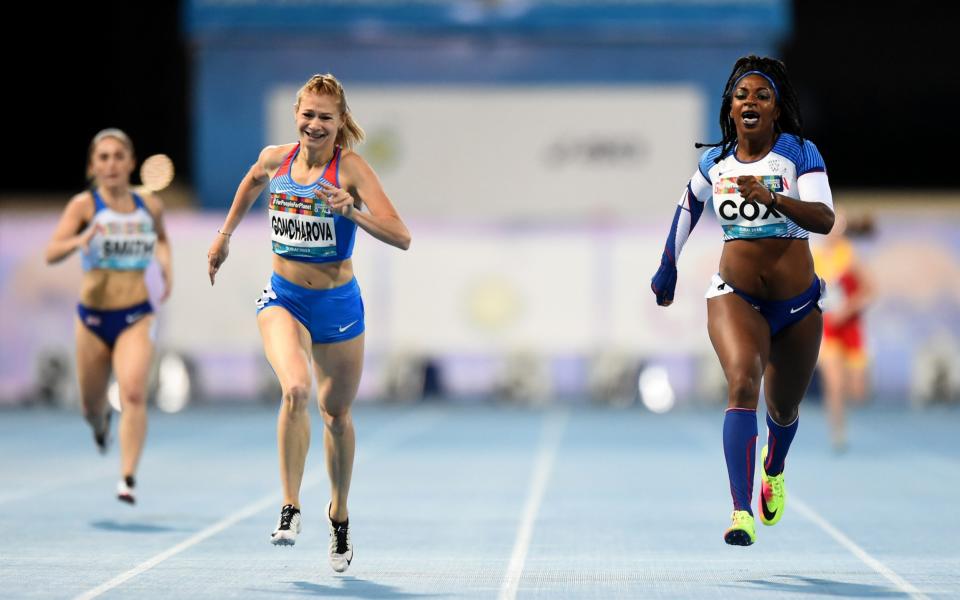Kadeena Cox defies eating disorder demons to claim 400m silver at World Para Athletics Championships

Given the seriousness of the ongoing eating disorder Kadeena Cox struggles to manage on a daily basis, narrowly failing to retain her T38 400m world title in Dubai on Monday night seems pretty trivial.
Without willing to diminish their achievements in any way, so too gold medals won by Hollie Arnold and Jonathan Broom-Edwards. Sometimes winning does not feel that important.
Just three days before competing here, Cox had detailed the extent of her problems in a searingly honest blog post describing how a recent break-in at her home had plummeted her mental health to rock bottom.
“I turned to the only thing I know how to control,” she wrote. “Stuffing my face […] the overwhelming feeling of guilt […] the inevitable vomiting”. She then forced herself to survive off nothing but water for more than 24 hours and repeated the cycle again and again.
It was in an exclusive Telegraph Women's Sport interview in April that Cox first opened up about her problems. “I don’t remember what normal eating is,” she admitted, describing speaking out as “a cry for help”.

Of most concern is that the problem remains as bad as ever, in spite of professional help from British Athletics and British Cycling (she made history in 2016 by winning Paralympic titles in both sports).
“It’s been really tough,” she told Telegraph Sport after claiming silver in Dubai. “This has been the most I’ve struggled with it at a major championships. Just trying to find ways to manage it has been quite hard.
“Because people now know, I feel like eyes are on me and that makes me more paranoid, which pushes me to do more extreme things. I know I shouldn’t do that, but it’s quite hard to tell the demon in my head to shut up.”
Considering not only those mental battles, but also the career-threatening knee injury she suffered in late 2017, it was some achievement to even make it to the startline in Dubai for only her second 400m race since winning the world title two years ago.
Perhaps the rustiness was to blame for what she described as a “tactically bad race”, starting too slowly and leaving herself too much to do in the closing stages to overhaul Russia’s Margarita Goncharova. Despite losing ground with every step in the home straight, Goncharova was able to cling on to triumph in one minute 2.08 seconds, with Cox 0.12sec behind.

Cox, who developed multiple sclerosis after suffering a stroke in 2014, intends to double up again in athletics and cycling at next year’s Tokyo Paralympics, just as she did to great success at Rio 2016. The hope, she says, is for her to be “in control” of her eating disorder by then.
“I don’t think it’s ever going to go away,” she said. “It’s been there for a long time but it’s got worse and worse. The time out through injury has made it that little bit harder.
“I think I can get back to a place where I’m more in control and there are small blips, as opposed to massive wobbles every two seconds.”
Unbeaten at global events for six years, Arnold looked likely to face the toughest battle of her career in Dubai after relinquishing her F46 javelin world record to serial runner-up Holly Robinson, of New Zealand, this summer.
In fact, a fourth successive world title was never in serious jeopardy. Arnold’s 44.73m winning throw was a big personal best and championship record, with Robinson some way below her best to claim yet another silver.
Broom-Edwards had also become accustomed to looking up at the top of the podium. A silver medallist at the last Paralympics and three World Para Championships, Broom-Edwards took advantage of the absence of his regular vanquisher, Poland’s Maciej Lepiato, to claim a nervy T44 high jump victory. Twice registering double failures at different heights, he eventually cleared 2.02m for the first global title of his career.
Competing on a world stage for the first time, 19-year-old Thomas Young broke the European T38 100m record in the heats and then again in the final. His time of 11.00sec was identical to that of China’s Dening Zhu, who was given gold by 0.007sec as Young took silver.
Having missed the podium in London two years ago, Paralympic F51 club throw champion Jo Butterfield claimed silver this time behind Ukraine’s Zoia Ovsii, who broke the world record to win gold.
